- Home
- Clair W. Hayes
The Boy Allies with Marshal Foch; or, The Closing Days of the Great World War Page 15
The Boy Allies with Marshal Foch; or, The Closing Days of the Great World War Read online
Page 15
*CHAPTER XV*
*THE CAPTURE OF SEDAN*
The American advance against Sedan was in full blast. All night thefighting had raged. Promptly at 6 o'clock on the evening of November 6General Lejeune had hurled the Second division forward in accordancewith the plans outlined by General Rhodes of the Forty-second.
Apparently the Germans had anticipated the attack, for they were bracedto receive it when the first Yankee troops began to move. The enemystood firm--and was continuing to stand firm almost twelve hours afterthe assault was launched.
There was a slight chill in the early November air as it grew light.The air was filled with shrieking shells and shrapnel. Rifle andmachine-gun fire rose even above the noise of the field and siege guns.Shrill whistles punctuated intervals of seeming silence as Americanofficers gave orders to their men. In the midst of battle, whistles aredepended upon mainly for signals--also there are signals given with thehands. The confusion is usually too great to permit verbal orders beingunderstood.
At the same time that General Lejeune attacked the enemy, GeneralRhodes, to the south, also had advanced. But the enemy was holdingstubbornly in that section of the field also, and at 6 o'clock on themorning of November 7 the American forces had made only slight progress.However, they were still hammering hard at the German lines.
With a gallantry not exceeded in the annals of the war, the Seconddivision kept at its task. When one enemy machine-gun nest wascaptured, they found themselves targets for others, whose gunners,discovered, had withheld their fire until the moment when it would bethe most effective.
Another grand assault was ordered by General Lejeune.
The Germans made a determined resistance. They put in fresh troops andsubjected the American lines to a terrific artillery bombardment of highexplosives and gas shells. Directly in the path of the advancingAmericans was a large wood. Although the wood was not yet cleared ofthe enemy, the American line here was farther advanced. Many prisonershad been taken.
A third attack resulted in the capture of still more prisoners and manymachine-guns. In the meantime the Ninth infantry, on the right of thatpart of the field where Hal and Chester found themselves, had advancedits position to the northern edge of the Bois de la Jardin and wasdigging in to beat off a possible counter-attack. In fact, the entireThird brigade, assisted by a battalion of the Second engineers, wasstrengthening its lines as well as possible under heavy enemymachine-gun and artillery fire.
The defensive part played by this brigade was very difficult. Itslosses were heavy as a result of enemy shell fire and gas bombardments,to which the Third brigade could not at the moment reply. Its duty nowwas to hold its lines. Its present action was confined to a rifle andmachine-gun duel with the enemy.
To the south, the First brigade also was hotly engaged. It had advancedin the face of a terrible artillery and machine-gun fire until at handgrips with the foe. Then ensued one of the fiercest struggles of thewar.
As in other encounters, the Germans proved no match for the Yankees athand-to-hand fighting. They resisted desperately, but gradually weredriven back. The Americans, with wild cheers, pursued them closely.
General Lejeune's center, composed of the Second brigade, with anadditional battalion or two of artillery, also was meeting with greatersuccess than the Third brigade, which, for the moment, had been checked.
The advance was pushed with desperate energy, and the Germans could nothold their ground in the face of the withering American fire. TheGerman center faltered, then broke.
Taking advantage of this success, General Lejeune pushed BrigadierGeneral Abernathy's Second division into the breach. Immediately, also,he ordered the First brigade forward in an effort to break through tothe south, while orders were rushed to the hard-pressed Third brigade tomake a final effort.
The task of the Third brigade was easier now. Bereft of its supports,the German center was obliged to yield ground to the Third brigade orrisk being cut off and surrounded.
The Germans gave ground slowly.
To the south, the First brigade also began to drive the foe moreswiftly. It appeared for a moment that the Germans would suffer a rout.Under the direction of their officers, however, they braced perhaps halfa mile farther back, and again showed a determined front.
Trenches dug by the Americans were abandoned now as the Yankees pouredforth in pursuit of the enemy. Not a man in the whole Second divisionwho was not sure that the trenches would never be needed for defensivepurposes. No one knew better the morale of the American troops than didthe men themselves.
Nevertheless, the advance slowed down in the face of the resistancebeing offered by the enemy. For a time it appeared that the fighting hadreached a deadlock.
The deciding touch to the battle was furnished by General Rhodes.
Sweeping up from the south, the Fifth, Sixth and Seventh brigades of theForty-second division bore off a trifle to the east and then turnednorth again, thus catching the enemy on the left flank.
This maneuver, apparently, had not been anticipated by the enemy'sgeneral staff, for it took the Germans by surprise. True, they receivedwarning in time to wheel machine-guns into position and to place bigguns to rake the Americans as they dashed forward. But the warning hadnot been received in time to permit the general staff to alter its planof defense, and for this reason proved the blow that broke the backboneof the enemy's resistance.
The enemy, closely pressed by General Lejeune, had no time to makechanges in his defensive plan necessitated by General Rhodes' suddenattack. Reinforcements could not be sent to check General Rhodes withoutweakening the front opposed to General Lejeune.
General Schindler, after a hasty conference with his staff, ordered aretreat to the lines just before Sedan. The Germans fell back rapidly.
Neither General Rhodes nor General Lejeune was content to rest with thisadvantage, but each decided to push on.
During all this time, the enemy had been successful in keeping a wedgebetween the Second and Forty-second American divisions. GeneralSchindler realized that if he hoped to extricate his men from the trapsprung by the Americans he must prevent a juncture of the Second andForty-second at all hazards.
Now, however, as the attack seemed on the verge of success, GeneralLejeune decided that the German wedge separating him from General Rhodesmust be pierced.
Accordingly, without permitting the advance to slacken elsewhere, hethrew the First brigade against it.
For perhaps fifteen minutes the fighting was fast and furious. In vainthe Germans tried to stem the tide in khaki that rushed forward againstthem. General Schindler further weakened his center to rushreinforcements in order to retain the wedge intact.
But it was no use. The Americans were not to be denied. They foughtwith the courage and desperation of lions. Little heed did they pay tothe hail of machine-gun bullets that swept them as they advanced.Artillery and explosive shells failed to stop them. Rifle fire was nomore effective.
Suddenly from the German lines sallied a regiment of cavalry. TheAmerican infantry braced to receive the charge.
At the same time Hal found himself before Colonel Taylor of the Firstbrigade with dispatches from General Lejeune. He had just deliveredthem as the German cavalry sallied forth.
"Great Scott! What a chance to take!" the lad muttered under hisbreath. "The Germans must be licked. This move can be for no otherpurpose than to give infantry time to withdraw."
The American infantry stood firm as the German cavalry hurled itselfupon them. Not an inch of ground did they give. Horses and men fell inheaps. Other chargers reeled back, throwing their riders beneath theirhoofs. At the same time the Yankee infantry poured in a hail of riflefire.
The Germans retired a pace, reformed and charged again. The result wasthe same. Not an inch did the Americans give, and the execution in theenemy's ranks was fearful to behold.
"I guess that will stop that," Ha
l told himself.
He was right.
When the enemy's cavalry withdrew a second time it did not reform for athird charge. Instead, it fell back upon its infantry and artillerysupports, apparently fearing that the American infantry would pursue andannihilate it.
"I thought so," said Hal.
In the meantime, the German retirement in other parts of the field hadbecome more rapid. The lines before Sedan were abandoned gradually andat last there was nothing to keep the Americans from entering the citysave the cannonading of the German artillery from far to the rear of thetown.
But although the bulk of the German army had retired safely to the eastof Sedan, fortune had not been so kind to the two brigades which hadformed the wedge between the Second and Forty-second American divisions.
When General Lejeune's men had pushed back the cavalry attack, GeneralRhodes, to the south, had gained an inkling of what was going on.Accordingly he had ordered an attack upon the hard-pressed foes.
Caught thus between two fires, the Germans tried first to hold theirground, and, finding this could not be done, to retreat orderly.
But they had delayed too long.
Three regiments of the First brigade of General Lejeune's division hadbeen hurried forward to cut off a movement, and the Germans, when theyfound flight blocked, became disheartened. In spite of the fact thatthey outnumbered the little force between them and the bulk of theirarmy, thousands of men threw down their arms and surrendered. Thisforced the others to follow suit or be annihilated.
Less than two hours later, with German shells still falling among them,American troops entered Sedan.
And the French population, virtual prisoners for many months, receivedthem with wild acclaim. It was a joyous day for the citizens, indeed.

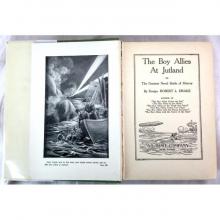 The Boy Allies with the Terror of the Seas; Or, The Last Shot of Submarine D-16
The Boy Allies with the Terror of the Seas; Or, The Last Shot of Submarine D-16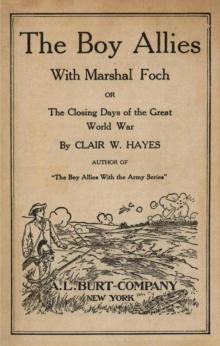 The Boy Allies on the North Sea Patrol
The Boy Allies on the North Sea Patrol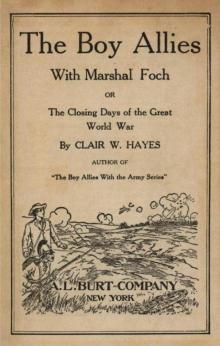 The Boy Allies in the Baltic; Or, Through Fields of Ice to Aid the Czar
The Boy Allies in the Baltic; Or, Through Fields of Ice to Aid the Czar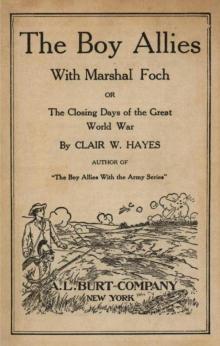 The Boy Allies with Marshal Foch; or, The Closing Days of the Great World War
The Boy Allies with Marshal Foch; or, The Closing Days of the Great World War Boy Allies with Haig in Flanders; Or, the Fighting Canadians of Vimy Ridge
Boy Allies with Haig in Flanders; Or, the Fighting Canadians of Vimy Ridge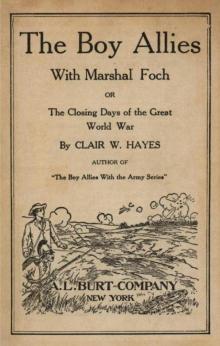 Boy Allies with the Victorious Fleets; Or, The Fall of the German Navy
Boy Allies with the Victorious Fleets; Or, The Fall of the German Navy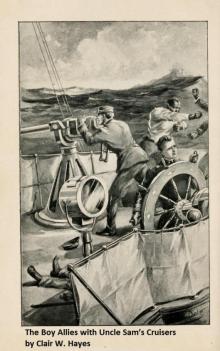 Boy Allies with Uncle Sam's Cruisers
Boy Allies with Uncle Sam's Cruisers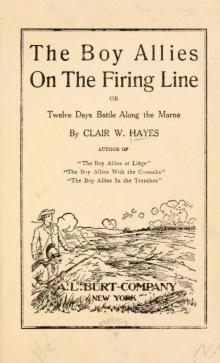 Boy Allies at Liège; Or, Through Lines of Steel
Boy Allies at Liège; Or, Through Lines of Steel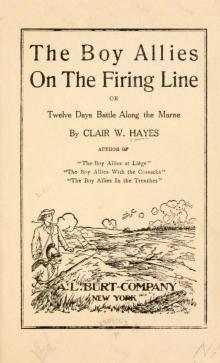 Boy Allies on the Firing Line; Or, Twelve Days Battle Along the Marne
Boy Allies on the Firing Line; Or, Twelve Days Battle Along the Marne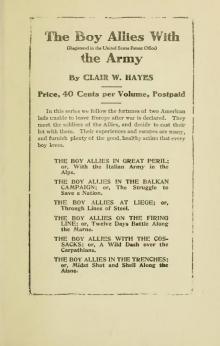 Boy Allies in the Balkan Campaign; Or, the Struggle to Save a Nation
Boy Allies in the Balkan Campaign; Or, the Struggle to Save a Nation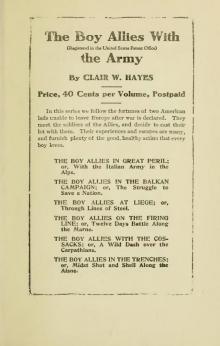 Boy Allies in the Trenches; Or, Midst Shot and Shell Along the Aisne
Boy Allies in the Trenches; Or, Midst Shot and Shell Along the Aisne Boy Artist.
Boy Artist.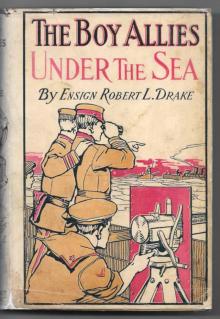 Boy Allies Under the Sea; Or, The Vanishing Submarines
Boy Allies Under the Sea; Or, The Vanishing Submarines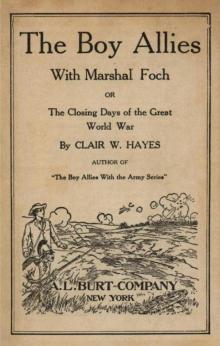 Boy Allies under Two Flags
Boy Allies under Two Flags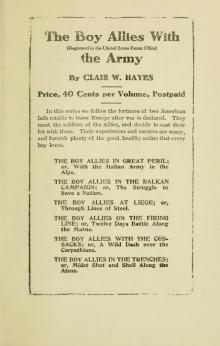 Boy Allies in Great Peril; Or, With the Italian Army in the Alps
Boy Allies in Great Peril; Or, With the Italian Army in the Alps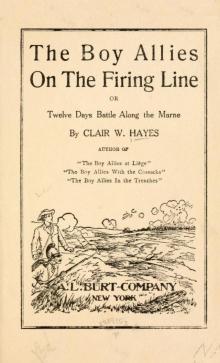 Boy Allies with the Cossacks; Or, A Wild Dash over the Carpathians
Boy Allies with the Cossacks; Or, A Wild Dash over the Carpathians